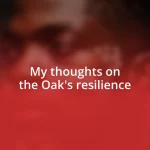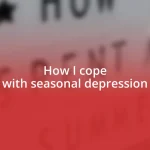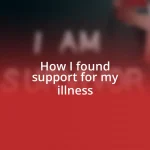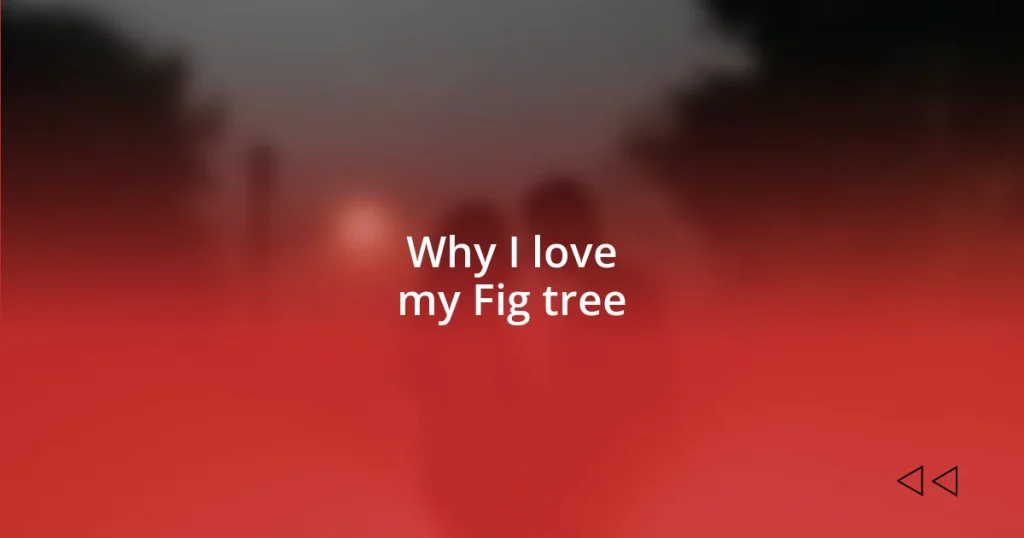Key takeaways:
- Grief is a complex, non-linear journey that involves both sorrow and cherished memories, highlighting the importance of acknowledging emotions.
- Seeking support through friends, support groups, and professional help can significantly aid the grieving process, fostering connection and understanding.
- Finding healthy expressions of grief, such as creative outlets and rituals, can help individuals honor their loved ones while navigating the long-term effects of loss.
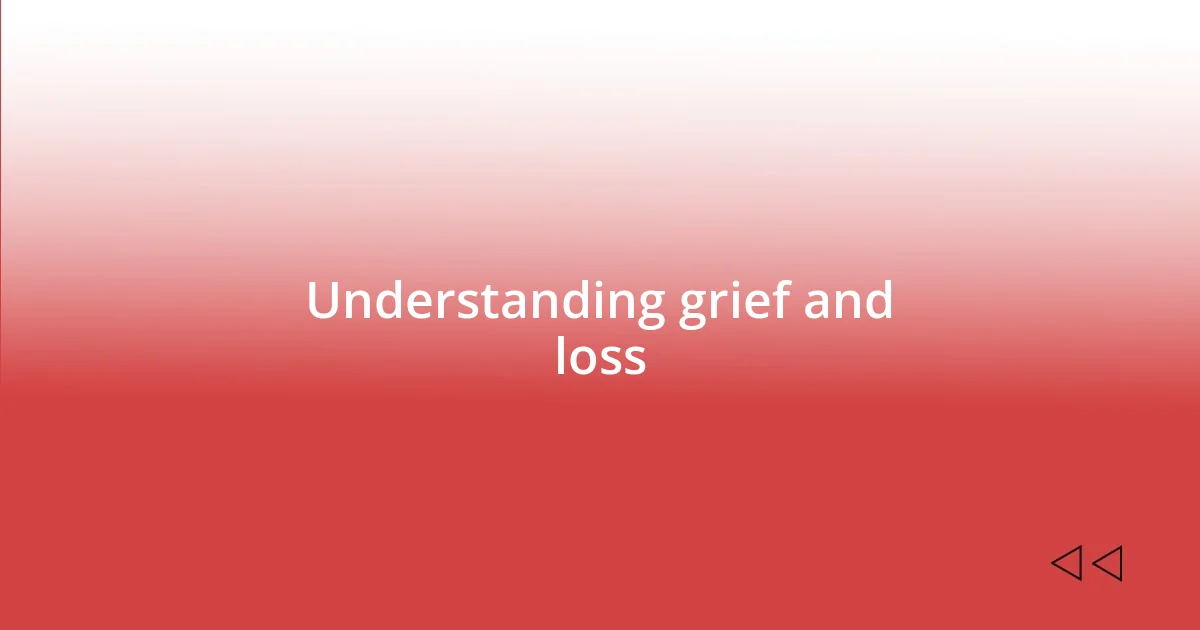
Understanding grief and loss
Grief is such a profoundly personal experience; I often find myself reflecting on how it feels like walking through a thick fog. Each day is different, and sometimes, it’s hard to distinguish between the heaviness of sorrow and the lightness of happy memories. Have you ever noticed how a simple memory can bring both a smile and a tear at the same time?
Loss changes us in ways we might not fully understand right away. When I lost my grandmother, I felt as though a part of my identity was missing. It was unsettling to think about how her absence would ripple through my life – from the small things, like Sunday dinners, to the larger questions of family and legacy. How do we navigate life when someone we love is no longer there to guide us?
Understanding grief also means recognizing that it doesn’t follow a linear path. One moment, I could be reminiscing and laughing about shared moments, and the next, a wave of sadness would wash over me unexpectedly. It’s a reminder that healing is not a straight line; it’s a complex dance between holding on and letting go. How have you observed this ebb and flow in your own experience?
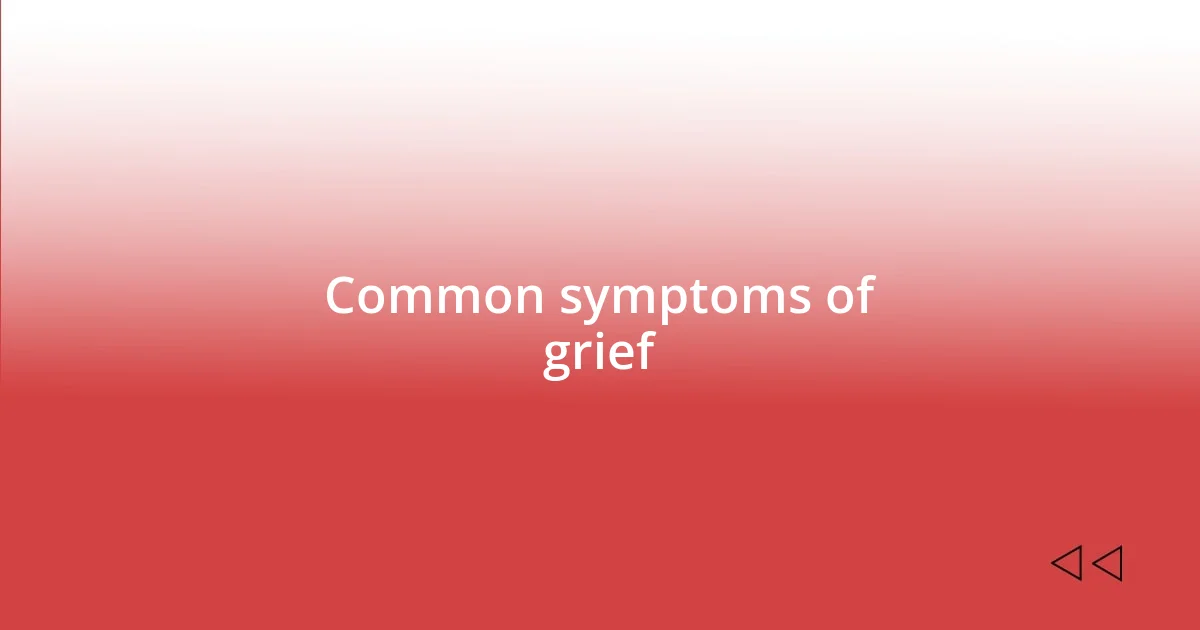
Common symptoms of grief
Grief can manifest in various ways, often catching us off guard with its intensity. I remember feeling a persistent fatigue that seemed to seep into my bones – not just physical tiredness, but an emotional exhaustion that made even getting out of bed feel like a monumental task. It’s remarkable how grief can impact our bodies alongside our minds.
The symptoms of grief are as diverse as the individuals who experience it. Here are some common signs you might recognize:
- Emotional numbness: Feeling disconnected from reality or unable to process emotions.
- Intense sadness or anger: Fluctuating between crying spells and irritability, sometimes igniting at the smallest trigger.
- Physical sensations: Experiencing aches, pains, or tightness in the chest that feels like a constant reminder of loss.
- Changes in appetite and sleep: Either losing interest in food or comfort eating, and similarly, finding it hard to sleep or sleeping excessively.
- Social withdrawal: Isolating oneself from friends and family, feeling like no one can understand what you’re going through.
- Sense of confusion: Finding it hard to concentrate or make decisions, as though you’re perpetually foggy-headed.
I often recall how I had moments when everyday tasks became overwhelming, and I would stare blankly at my to-do list. Understanding these symptoms helps me realize that I’m not alone in this complex emotional landscape. Sharing these experiences can foster a sense of connection, don’t you think?
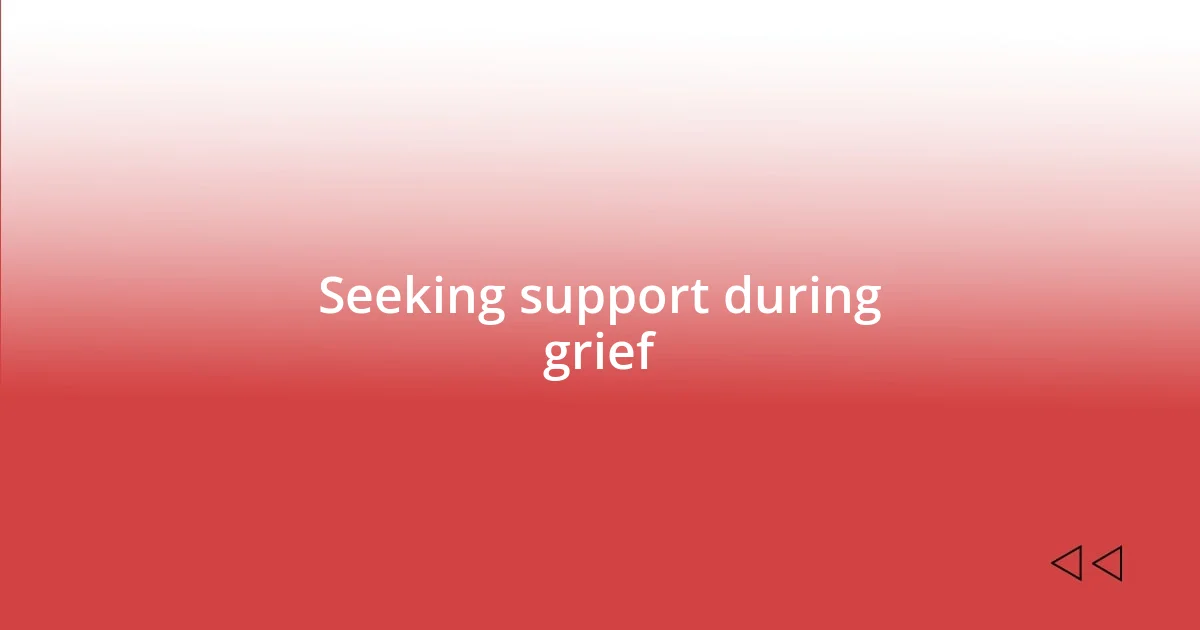
Seeking support during grief
Seeking support during grief can often feel daunting, but it’s essential to remember that you don’t have to navigate this journey alone. I found solace in reaching out to friends who had experienced similar losses; their understanding fostered a space where I could share my feelings without fear of judgment. Have you ever been surprised by how a simple conversation can lift some weight off your shoulders?
Participating in support groups was another stepping stone for me. It was comforting to be surrounded by others who truly understood the depths of sorrow. I remember attending my first meeting, and while I was nervous, sharing my story helped me feel less isolated. Each person’s perspective offered new insights into how to cope, enriching my understanding of loss and resilience.
Alongside personal connections, seeking professional help can be incredibly beneficial. Therapists trained in grief can guide us through our emotions. There were moments when I realized I needed someone objective to help me process my grief. They provided tools and strategies that I could use to face difficult days, empowering me to embrace vulnerability rather than shy away from it.
| Support Type | Benefits |
|---|---|
| Friends and Family | Provides a comforting and familiar space for sharing feelings. |
| Support Groups | Offers collective understanding and shared experiences. |
| Professional Help | Equips with coping strategies and provides an objective perspective. |
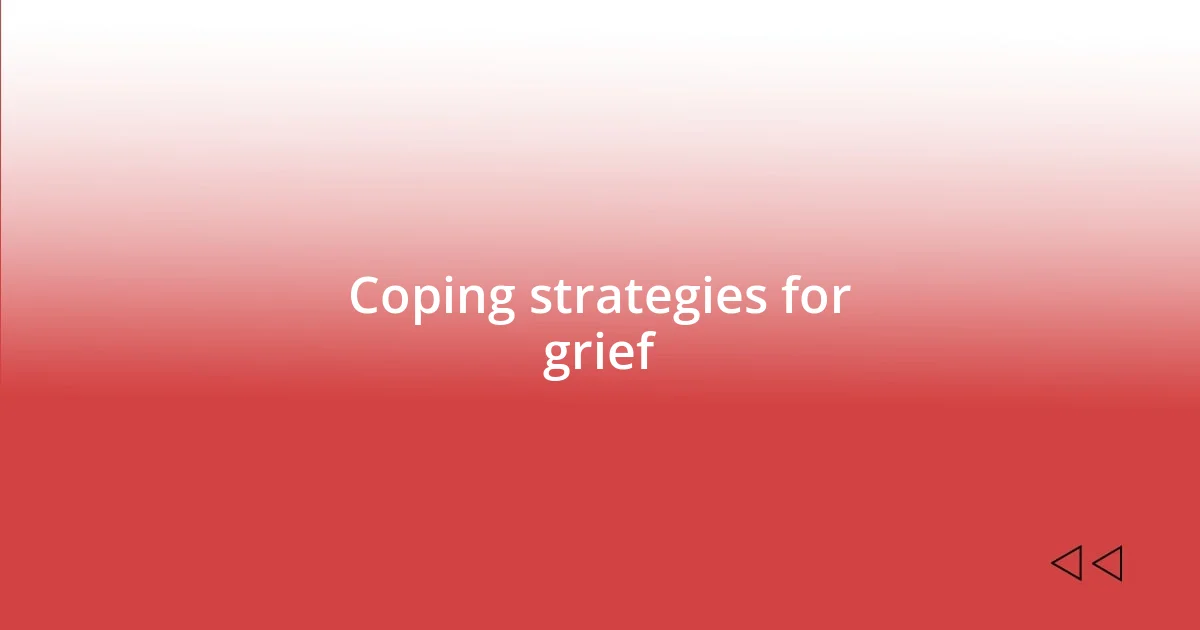
Coping strategies for grief
Coping with grief often requires us to explore various strategies to find what resonates with us most. One approach that helped me was creative expression. I took up journaling, pouring my thoughts onto the page when words failed me in conversation. It’s amazing how writing can transform swirling emotions into something tangible. Have you ever found relief in putting pen to paper?
Another strategy worth considering is physical activity. I remember how, after losing a loved one, simply taking a walk brought moments of clarity. The rhythmic motion and fresh air helped ground me, acting as a form of meditation. It’s as if each step was a small release, and I felt lighter with every stride. Do you have a favorite way to move your body that brings you peace?
Finally, establishing a routine can be a strong anchor in the turbulent waters of grief. When everything feels chaotic, I found comfort in small, daily rituals—like brewing my morning coffee or setting aside time for a favorite book. These simple actions provided a sense of normalcy amidst the sadness. Have you noticed how a consistent routine can offer a familiar structure to your day?
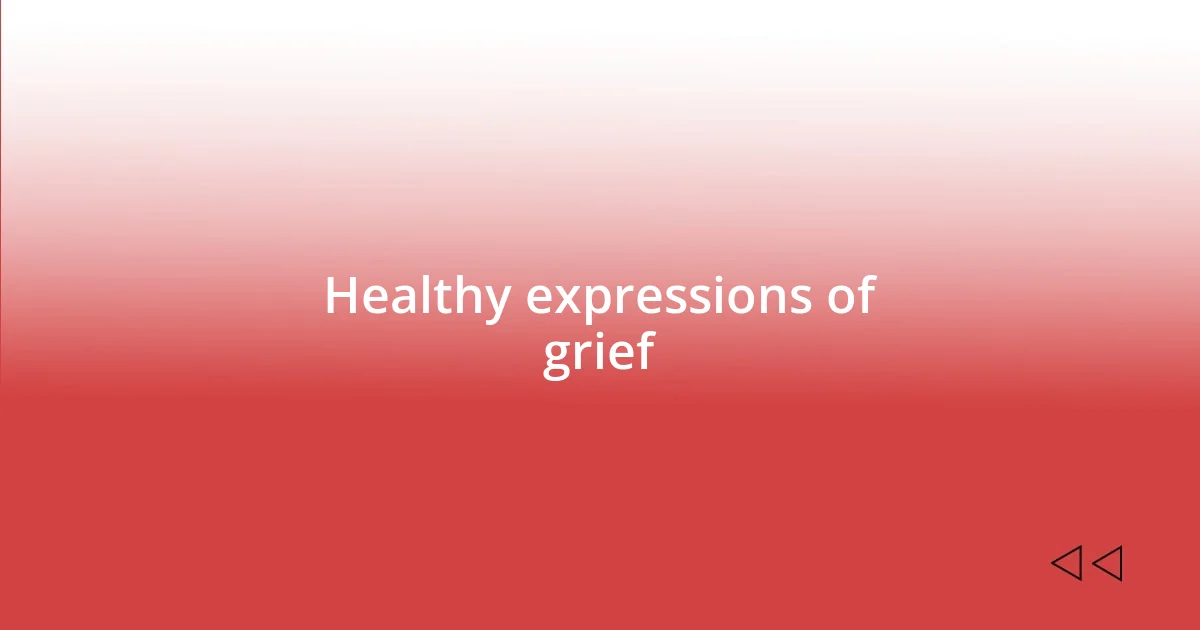
Healthy expressions of grief
Healthy expressions of grief can take many forms, and connecting with our emotions is vital. I vividly recall the first time I allowed myself to cry openly; it felt like releasing a pressure valve. Have you ever experienced that kind of overwhelming release? It was liberating, reminding me that it’s okay to not be okay and that tears can be a profound way of honoring the love and memories we cherish.
Finding ways to express grief through creativity has also been a valuable outlet for me. One of my most meaningful experiences was creating a scrapbook filled with mementos and photos of my loved one. As I cut, pasted, and wrote, I felt a sense of connection, as if I was keeping their spirit alive. It’s fascinating how art can serve as both a reflection and a tribute to our feelings. What kind of creative outlets do you find resonate with your emotions?
Another healthy expression involves simply sharing our stories. There was a moment when I gathered my closest friends to reminisce about my loved one. The laughter, tears, and stories exchanged felt like a warm hug; it was a way to keep their memory alive while feeling supported by those around me. How does sharing memories with others shape your experience of grief? From my perspective, these expressions create a beautiful tapestry of love and loss, reminding us that while grief is a personal journey, it can also be a shared experience.
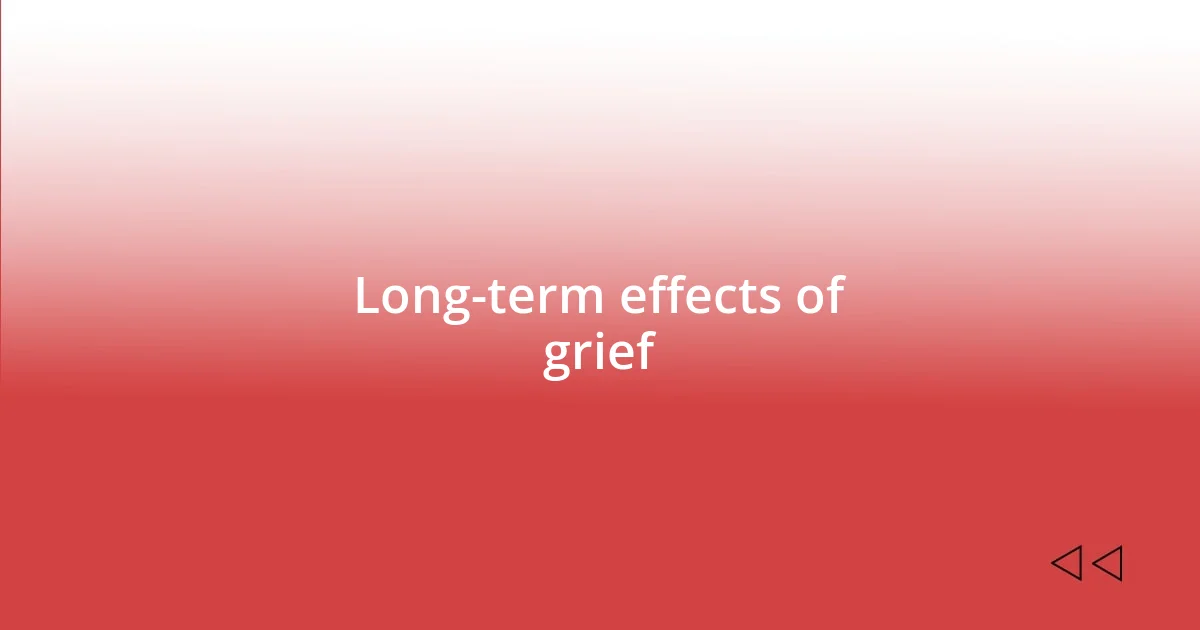
Long-term effects of grief
Grief doesn’t just linger; it often reshapes how we perceive the world around us over time. I remember after losing someone close, my perspective on relationships shifted dramatically. I became more attuned to the fragility of life, leading me to treasure my connections more deeply. Have you ever noticed how grief can refine your view of what truly matters?
The long-term effects can also manifest in unexpected ways, such as changes in our mental health. I struggled with anxiety for a while, as my mind replayed memories and questions. The voices of “What if?” and “If only” seemed to echo endlessly. Have any of you felt that weight of unresolved emotions weighing heavily on your psyche? For many, this haunting uncertainty can become part of the grieving process, illustrating just how intertwined grief is with our mental well-being.
Moreover, grief can subtly influence our physical health. I noticed that my body responded differently, perhaps because of the stress and emotional turmoil I experienced. At times, it felt as if a cloud of fatigue settled over me, making simple tasks like getting out of bed feel monumental. It’s crucial to recognize these signals; our body often speaks volumes about the emotional battles we may not fully address. Do you ever catch yourself feeling physically exhausted without knowing why? It’s a gentle reminder that grief has a long-lasting imprint, physically and emotionally.
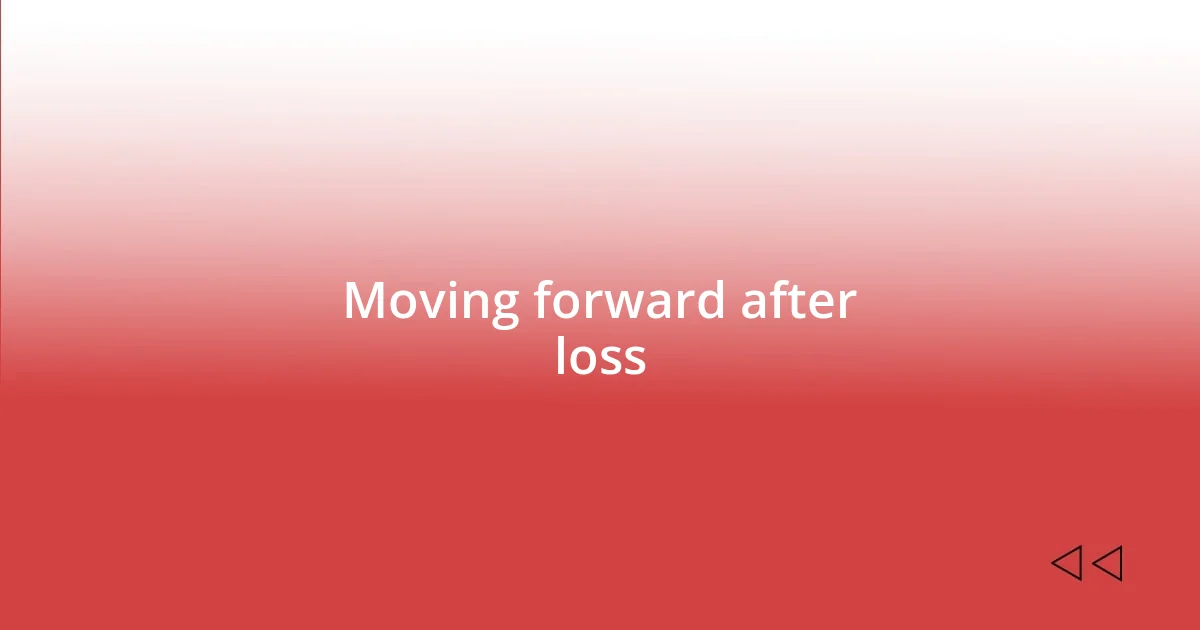
Moving forward after loss
Moving forward after loss can often feel like navigating an uncertain path, filled with both hope and hesitation. I once had a mentor who shared a simple but powerful insight: “Grief is like a backpack; you don’t get rid of it, you just learn to carry it differently.” This phrase resonated deeply with me. It made me realize that rather than wishing the pain away, I could acknowledge it while also seeking new ways to honor the person I lost.
In my journey, I found that setting small, meaningful intentions each day helped me gradually heal. For instance, I began lighting a candle every Sunday in memory of my loved one. This simple ritual not only connected me to their spirit but also created a moment of reflection amidst the chaos of life. Have you ever tried creating a routine that brings you comfort? It’s remarkable how these little acts can provide stability and remind us that moving forward doesn’t mean leaving our memories behind.
As time went on, I started to embrace change more openly. I took a leap and signed up for a class related to something my loved one was passionate about. Stepping into that classroom felt daunting yet liberating, like opening a door to new experiences fueled by their memory. It was possible to move forward while carrying a piece of them with me. What if we could transform our grief into a force for growth? I believe that moving forward after loss is not about forgetting, but rather about integrating our experiences into a richer, more fulfilling life.






